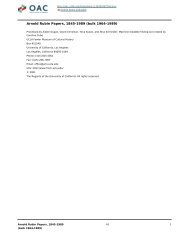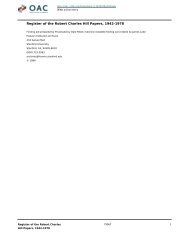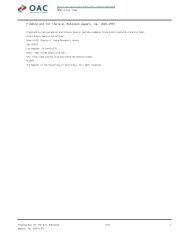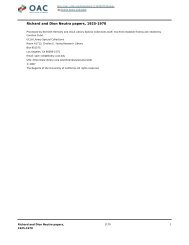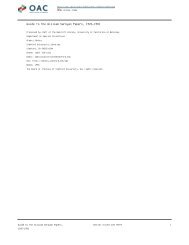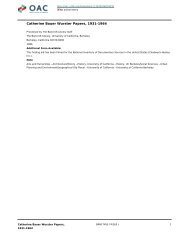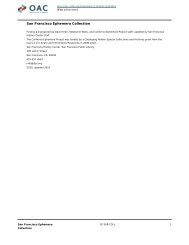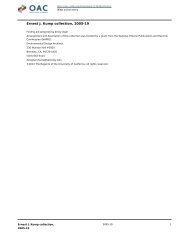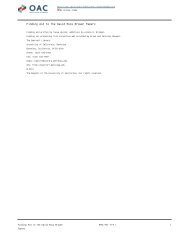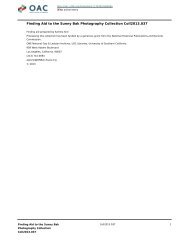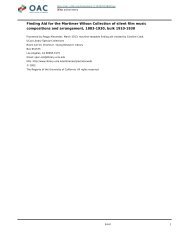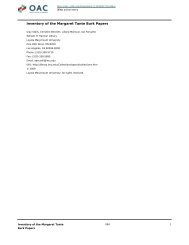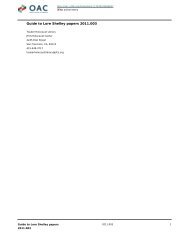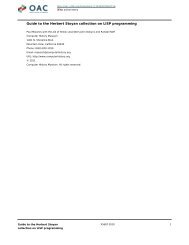Andrei Voznesenskii papers - OAC PDF server
Andrei Voznesenskii papers - OAC PDF server
Andrei Voznesenskii papers - OAC PDF server
You also want an ePaper? Increase the reach of your titles
YUMPU automatically turns print PDFs into web optimized ePapers that Google loves.
destroyed a year's work. Whole districts and cities on blueprints had vanished. We were so tired that we were glad thatfinal examinations had to be postponed. But for me it was more than a fire. I believe in symbols. I understood thatarchitecture was burned out in me. I became a poet". <strong>Andrei</strong> <strong>Voznesenskii</strong> was a disciple of Boris Pasternak during his earlyyears. "Your entrance into literature was swift and turbulent. I'm glad I've lived to see it", Boris Pasternak wrote to a14-year old youngster who had sent him his early verses asking for the great poet's opinion. Starting with his poem"Masters", Andrey <strong>Voznesenskii</strong>'s poetry burst into the poetic environment of contemporary life winning the praise ofmillions of readers. Since then, he published numerous collections, including "The Triangular Pear", "Antiworlds","Stained-glass Master", and "Violoncello Oakleaf". His more recent creations are "Videoms" and "Fortune Telling by theBook". Some of his works were turned into theater productions, like "Antiworlds" and "Save your Faces" at the TagankaTheater, " 'Juno' and 'Avos' " at the Lenkom Theater and some others both in Russia and abroad. By now, <strong>Voznesenskii</strong> isthe author of approximately 40 volumes of poetry in Russian, two collections of fiction, at least three plays and two operas.A five-volume set of his collected works appeared in 2000. A number of his works have been translated into English,including "Antimiry", translated by W.H.Auden and others as "Antiworlds". He has also created many works of visual art, ingraphic and sculptural form. The poet has always striven for a synthesis of arts combining his readings with music anddemonstration of his new videom genre. His "Videoms" were successfully exhibited at the Moscow Pushkin Museum of FineArts, as well as in Paris, New York, and Berlin. He was elected the member of eight Academies in different countries of theworld, including Russian Academy of Education, American Academy of Arts and Letters, The Goncourt Brothers Academy inParis, the European Academy of Poetry, the Bavarian Academy of Fine Arts, and of the French Academie Merimee.<strong>Voznesenskii</strong> has won a number of prizes and honors, among them the International Poetry Forum's International Award fordistinguished achievement in poetry, in 1978. Despite his honors, <strong>Voznesenskii</strong> has always been controversial, earning bothpraise and criticism. His poetry is experimental in many ways, always novel and on the cutting edge of creative endeavors.His works are an original synthesis of deep lyricism and profound philosophical concepts, musical and sounding like apowerful warning bell at the same time. But he has been accused of experimentation for its own sake, name-dropping andsimplistic moral rhetoric, as well as superficiality. The Soviet authorities sometimes objected to his political stands (he wasalso a co-author of "Metropol" underground poetry and prose anthology) and even accused him more than once of being aCIA spy. There was a period in <strong>Voznesenskii</strong>'s life when he was severely criticized by Soviet leaders, including NikitaKhrushchev himself. Criticism of <strong>Voznesenskii</strong> mounted, in most menacing fashion, in 1963, during the vast officialcampaign against Russia's liberal-minded modernist writers and artists. The campaign was launched by Khrushchev at thenow famous Manege exhibition of modern art, where he denounced the painters in a torrent of scatological abuse andequated their work with homosexuality - "and for that", he said, "you can get ten years". Khrushchev's fury turned quicklyto the writers, whom he abused in much the same terms he used against the painters, at closed meetings held betweengovernment leaders and writers, artists, and other intellectuals. <strong>Voznesenskii</strong> was even threatened with deportation fromRussia. In its public aspect, the campaign raged for seven months in the press, and at writers' meetings held all over thecountry where Stalinist mediocrities proceeded to vent their pent-up anger and jealousy on nearly every young writer whohad received public acclaim during the last years - particularly <strong>Voznesenskii</strong> and Evgenii Evtushenko. They called for an endto the editions of 100,000 copies, the favorable reviews, and the trips abroad for writers who, they claimed, flout Partyopinion and play the game of Western bourgeois ideologists ("with one foot on Gorky Street and the other on Broadway") intheir "rotten, overpraised, unrealistic, smelly writings". It is in this context that <strong>Voznesenskii</strong>'s immense popularity,inconceivable in the West for a "serious" modern poet, may be fully understood. If 14,000 people congregated (as they didin 1962) in a sports stadium to hear <strong>Voznesenskii</strong> read his poetry, or 500,000 subscribed to buy a book of his poetry ("AnAchilles Heart"), it is because countless Russians turned to the language of symbol and fantasy for the truths they seek.One result was the rage for poetry readings which seized Russia in the post-Stalin decade. Until the crackdown of 1963severely curtailed poetry readings had become the principal entertainment of intellectuals and students in Moscow, and inprovincial cities, where poets went by the truckload. In classic purge style, recantations were demanded of the writers.Here <strong>Voznesenskii</strong>, together with most of the other writers, proved to be elusive. Many maintained silence, or defendedthemselves; although the writers were hardly offered a forum in the Soviet press, reports from foreign Communistob<strong>server</strong>s indicated widespread defiance at the writers' meetings. Even recantations deemed fit to print in the news<strong>papers</strong>were often ambiguous or ironic. This was <strong>Voznesenskii</strong>'s response to a savage attack on him by Khrushchev: "It has beensaid at this plenum [of the board of the Soviet Writers' Union] that I must never forget the stern and severe words of NikitaSergeyevich [Khrushchev]. I shall never forget them. I shall not forget not only these severe words but also the advice,which Nikita Sergeyevich gave me. He said: 'Work'. I do not justify myself now. I simply wish to say that for me now themain thing is to work, work, work. What my attitude is to my country, to communism, what I myself am, this work willshow" (the newspaper "Pravda", March 29, 1963). The campaign petered out in late June of 1963. It had failed utterly in itsobjective to cow the writers and humiliate them before the nation, and to re-establish controls, on the Stalinist model, overliterature. The writers had clearly won a moral victory. The authorities had to settle for an undeclared truce with the liberalwriters, which has been maintained (with some grave lapses) during the first two years of the post-Khrushchev era. TheGuide to the <strong>Andrei</strong> <strong>Voznesenskii</strong>PapersM1399 3



